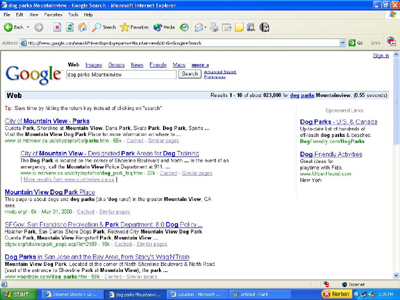Google search engine marketing and the power of location, location, location

Location is a key factor in residential and commercial real estate acquisition; Location is also a key factor in search engine real estate acquisition.
Among the findings of the April 2006 iProspect “Search Engine User Behavior Study”:
62% of search engine users click on a search result within the first page of results…90% of search engine users click on a result within the first three pages…
Brand equity is conveyed upon companies who rank at the top of the search results in the eyes of a percentage of the search engine user population. 36% of search engine users believe that the companies whose Websites are returned at the top of the search results are the top companies in that field.
The value of search engine real estate location was also implied by Google during its investor conference call last Wednesday:
Eric Schmidt, CEO: There’s evidence that keyword prices could rise significantly. Budgets are typically under-spent, that people would spend a great deal more money in our advertising model if we had the products and services that could capture and exploit that with the appropriate measures.
Jonathan Rosenberg, SVP, Product Management: I have the benefit of actually talking to a lot of these advertisers. When you go out and talk to these advertisers, which I would certainly encourage you to do, on a bang-for-the-buck basis, all of them — almost all of them — say the same thing, which is, if I could get more inventory that’s converting and delivering the ROI that I’m getting today, I would like it.
The notion of Google lacking ad inventory, however, may seem counterintuitive to the average Google user. After all, it is not unusual for a Google search to return over a billion stated results, representing seemingly unlimited opportunities for “Sponsored Links.”
Google, however, limits its inventory through its policy of inactivating certain keywords (previously called disabling), in order to allow only ads which "perform well" and thereby meet Google’s monetization objectives . As I wrote in my “More Questions for Google”:
The AdWords Help center "Keyword State - Inactive for Search" faq states: “A keyword marked inactive for search doesn't have a high enough Quality Score and maximum cost-per-click (CPC) to trigger ads on Google or the search network. This means your keyword's maximum CPC doesn't meet the minimum bid required to trigger ads. Inactive keywords aren't performing well.”
I also asked: It seems that marking a keyword “inactive for search”, or disabling it and thereby reducing your users’ access to information and reducing your advertisers’ ability to share their information with your users, is contrary to your stated mission to “organize the world's information and make it universally accessible."
During its investor conference call, while discussing the “targetability” of its advertising, Google seemed to provide further indications of a controlled inventory policy to provide for its targeted monetization:
Jonathan Rosenberg: I think it really revolves around a couple of things: mainly, trying to understand the degree to which there is commercial nature in the query. One of the things that you’ll basically see us doing at both ends of that spectrum is trying to give the user better, more clearly targeted ads on the highly commercial queries, and also try to eliminate the ads on the less commercial queries where an ad isn’t really appropriate.
So, for example, if you type in “dog parks Mountainview” into Google, it probably isn’t appropriate to get an ad. If you type that into Google today, you won’t get an ad. You will just get search results for dog parks. But if you try typing that into most of our competitors, you will tend to see a lot of very bad ads, ads that may be relatively inexpensive, but will maybe distract the user or steer to the user toward something that isn’t particularly valuable.
While Google took a bark at its competitors, however, it may be in the doghouse itself: below is a screenshot of the SERP returned when I did in fact “type in 'dog parks Mountainview'” into Google” today, including two “Sponsored Links.”

Does Google's keyword inactivation policy reduce user access to information? Join the conversation: "Talk Back" below to share your thoughts.